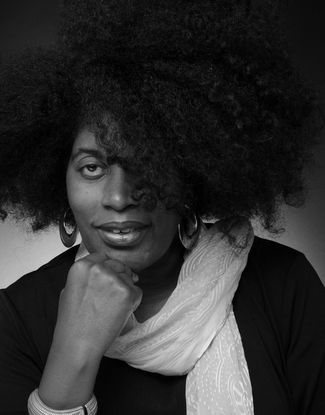
FLINT, MI– Semaj Brown’s mother raised her to act out the poetry she read.
The lesson stuck with Brown throughout her literary and educational career as she merged her love of science, literature and music into performances. The artist, educator and poet received a mayoral proclamation as Flint’s first poet laureate on Sept. 27.
Pamela Pugh, Flint’s Chief Public Health Advisor who presented the proclamation to Brown, said esteemed members in the arts and literary establishments recommended appointing the city’s first poet laureate as part of the city’s public health, recovery and resilience programming.
Brown was chosen to serve as Flint’s poet laureate because of “her unique history in the literary arts as a poet and author as well as (her) history in community health programming,” Pugh said.
Brown will work in conjunction with the city’s public health department, recognizing literature and literacy to be an integral component of a healthy vibrant society, according to Pugh.
“It’s an honor, it really is an honor,” Brown said.
In her most recent endeavor, “Bleeding Fire: Tap the Eternal Spring of Regenerative Light,” Brown combines science, health and social commentary into a book of poetry, prose and magical realism. Each poet laureate has their own platform, Brown said.
“At one time, poet laureates were more ceremonial. They would write poems for special occasions,” Brown explained. “But now, poet laureates will often have programming they want to implement. I have ambitious goals.”
The position of poet laureate is voluntary. As poet laureate, Brown wants to create a website to connect all of the literacy initiatives in Flint, provide recorded stories for children and create awareness for a more literate community. Brown is currently seeking a grant writer to help her with these goals.
“I’d like to show how poetry intersects with everything,” Brown said.
‘When all of these things fused together, that’s just who I became’
Semaj Brown was born and raised in Detroit and came to Flint later in life.
Bessie James, Brown’s mother and a classically trained pianist, submerged Brown in literature and nurtured her appreciation for world cultures. Every summer, Brown would visit her adoptive grandmother in Ontario, where she studied Shakespeare.
Back at home, Brown conducted science experiments and grew crystals in the makeshift laboratory she housed in her parent’s basement. As a girl, Brown played violin in the Highland Park Chamber Orchestra. All of these cultural experiences morph together in Brown’s writing.
“When all of these things fused together, that’s just who I became,” Brown said,
She added that her writing is lyrical because of her background in music.
“Everything that’s happening in this world is so interconnected that it’s almost all the same.”
As an artist, Brown belonged to the Broadside Press’ group of poets known as the “progeny” or the next generation following legacy poets of the 1960s such as Sonia Sanchez, Haki Madhubuti and Audre Lorde. The Broadside Press was founded in Detroit by Dudley Randall in 1965. The presses were known for publishing prominent black poets other presses wouldn’t.
Brown began her teaching career after earning a bachelor of arts degree in biological science from Wayne State University in 1986. Following her bachelor and graduate studies, Brown finished education, writing and literature classes. She went on to create integrated science curricula for Detroit Public Schools as an educator for 16 years.
Combining her experiences, Brown partnered with her husband and family physician, James Brown, to develop healthy initiatives curricula for the Flint community. Brown led 70 community workshops throughout Genesee County, educating residents on making healthier decisions.
As a community outreach director, Semaj Brown authored a radio program about health and the Planted Kingdom, a cookbook published in 2012. In the cookbook, Semaj Brown creates an array of characters like “Blanche Broccoli” that play out the significance of a healthier diet.
“I really loved and enjoyed this process and I thought I should share it with people. And so I did,” Semaj Brown said.
Returning to Flint
Semaj Brown moved around a bit, but then returned to Flint in the wake of the water crisis.
“I remember watching the news with my husband and saying ‘those are our people’,” Semaj Brown said. “We have to go back.”
Since her return, Semaj Brown created “Mother Ocean” an epic poem inspired by a photography exhibit “Women of a New Tribe” at the Flint Institute of Arts in 2017. She performed the poem, with her husband playing live music, at the FIA’s Tenth Anniversary Gala.
“Something was stirring in me. I hadn’t written poetry in a long time,” Semaj Brown said explaining the writing process for “Mother Ocean.”
In 2018, Semaj Brown began teaching and consulting for the Boys and Girls Club of Greater Flint and orchestrated the program “Creating a Vegetable Consciousness through Science, Craft Work, Visual Arts, Music and Theater.”
This year, Semaj Brown was asked to create a poem honoring Mayor Karen Weaver on her birthday. The poem, “Fire Weaver”, is an allegorical fable that connects African iron forgers to Flint steel factory workers. The poem concludes with Weaver using fire to resolve the water crisis.
Semaj Brown performed passages at the Charles H. Wright Museum of African American History in Detroit on May 18 to celebrate the launch of “Bleeding Fire: Tap the Eternal Spring of Regenerative Light.”
The poet laureate is placing a call for writers, poets and retired educators to join her as she tries to make Flint more literate aware and poetry conscious.
“My charge is huge,” Semaj Brown said. “And so I need to formulate programming with other retired teachers. With people who can read, write and teach poetry.”

